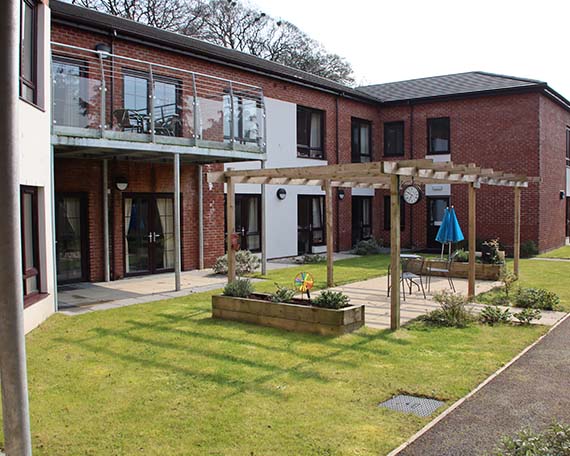How Much Do Care Homes Cost?

The need for care homes in the UK has grown progressively as life expectancy continues to rise. Alongside this heightened demand, fees for those seeking care have also escalated due to the increased cost of living. These rising costs have posed challenges for individuals seeking care and their family members, as it becomes more complex to estimate the financial implications.
In this blog, we look at the fees associated with care homes in the UK, what services are encompassed within these fees and outline the available financial assistance.

Care Homes in the UK
Every care home and nursing home throughout the UK structures their fees differently. Generally, nursing homes tend to have higher costs due to the increased level of support they provide. Another important aspect to consider when exploring different care homes is their location. The geographical location of a care home significantly impacts its cost, with homes in the southern parts of England, particularly London, being considerably more expensive compared to those in the northern regions of the country. Additionally, the range of amenities provided by a care home will also influence the fees, and some facilities may impose extra charges for certain services.
In the United Kingdom, the majority of care home fees cover accommodation, meals and care services on a pay-as-you-go basis. There are care homes that offer an all-inclusive living arrangement. Supplementary services like visits to the hair salon, local outings and the use of recreational facilities such as cinema rooms are usually not included and are subject to additional charges. However, some care homes do opt for an all-inclusive living approach where many of these supplementary services are encompassed within the standard fees.
Usually, the responsibility for covering care home fees lies with the individual in need of care or one of their family members. However, in certain situations, individuals requiring care may be eligible for financial support services from the NHS or their local authority to cover their nursing home costs.
Care Home Costs in the UK
On average, care home fees for residential care are approximately £700 per week, while the yearly charges for care home services range from £27,000 to £39,000. Specialised care services, like nursing care or dementia care, generally have a lot higher care costs due to the increased level of hands-on attention required.
Another key factor influencing the fees is the geographical location of the care home or nursing home. On average, residential care homes located in the southern regions of England tend to carry higher costs in comparison to those situated in the North West of the UK and certain areas of Northern Ireland. For instance, a care home in London will come with a higher price tag.
It's essential to recognise that these figures represent the average care home expenses in 2023. Nevertheless, it's important to acknowledge that the actual fees can vary based on a specific care home or nursing facility, as well as the services they deliver.
Residential Care Home Costs
The expenses associated with residential care are normally a standard base fee, to which additional charges might be applied when certain services are used. If you're staying exclusively in a residential care home, these costs typically encompass your accommodation, utility expenses, all meals and the care services provided.
Dementia Care Home Fees
This service is specifically designed for individuals who are living with dementia. In 2023, research shows there are more than one million residents across the UK who are impacted by this condition and research indicates that this number will keep rising.
In comparison to residential care, the expenses for dementia care are notably higher due to the specialised care that is needed. The staff at these dedicated care facilities undergo training to ensure that precise and suitable care is provided.
Nursing Care Costs in the UK
Nursing care requires more involvement from a Registered Nurse and often leads to higher costs in comparison to other forms of care homes, such as residential care. While the charges can vary, they generally include accommodation costs, meals, support services and the expenses associated with nursing care. Due to the elevated level of intensive assistance needed, nursing care involves higher expenses.
The Cost of Respite Care
Respite care serves as a service intended to provide short-term assistance to individuals who require temporary support, such as those recovering from illness or surgery.
This service also provides caregivers with a reprieve from their responsibilities while assisting care recipients with their daily activities. Respite care costs can differ, depending on the duration of the stay and the level of assistance needed.
Palliative Care Costs in the UK
Palliative care, frequently referred to as end-of-life care, is a compassionate service extended to individuals facing a serious illness or health condition. This situation can arise due to the natural process of aging or due to the presence of a terminal illness or a health condition of considerable concern.
Usually, the expenses associated with this service follow a pay-as-you-go framework, and will have similar costs to nursing care, due to the intense assistance required from a team of nurses to ensure a quality way of life during an individual's final moments.
Care Costs & What is Included
Generally, the fees associated with nursing homes and care homes cover accommodation, personal care, activities and meals.
Each care home however is different and certain establishments might impose extra charges for supplementary services. When looking at various homes, it's advisable to enquire about what is included and excluded within the pricing structure to avoid any unexpected costs. Nonetheless, certain nursing homes and care homes offer a comprehensive all-inclusive lifestyle choice.
In addition to additional services, the location impacts the amount you will pay for the cost of care.

What is an All-Inclusive Care Home?
In the UK, there is a growing trend towards comprehensive all-inclusive care homes and nursing homes, despite their higher price points. This rise in popularity can be attributed to the consistent pricing and conveniences they offer to care seekers and their loved ones.
With the current challenges in the cost of living, the prospect of avoiding unexpected expenses on top of regular fees brings a sense of reassurance to older people and their families. Opting for residency in an all-inclusive care home or nursing home guarantees the coverage of care, support, accommodation, amenities and meals within the designated fees.
All-inclusive care homes and nursing homes across the UK have a range of fee structures. Within the fees, normally there are array of services, amenities and activities for the residents to use. However, it is important to identify a home capable of providing the appropriate levels of tailored care that that specific individual needs.
In most all-inclusive homes, there is a range of care options such as Residential Care, Nursing Care, Respite Care, Dementia Care and Palliative Care.
How Care Home Fees Are Paid for
Typically, the responsibility for covering the costs of care falls on the individual requiring assistance or sometimes on their family members. Nevertheless, not all individuals have the financial resources to independently manage these expenses. Individuals in need of care, who are also facing financial limitations, have the option to seek financial support from their local authority.
In such cases, the local authority will help cover the fees associated with care homes. The extent of this financial assistance is determined through a comprehensive financial assessment, which evaluates the individual's savings, assets and private and state pensions. This assessment essentially checks whether the combined financial resources exceed or fall below a certain threshold. This financial assessment is known as a means test and will help guide the overall decision. If the assessment is successful, the care home or nursing home costs will be either partially or entirely funded.
For those who possess the financial capacity to independently cover their care expenses, seeking advice from a financial advisor is of paramount importance. This strategic move ensures the ability to sustain the cost of care throughout the entire duration of their residency. Furthermore, it facilitates the exploration of alternative options if the need arises, including the possibility of arranging supplementary payments, commonly referred to as top-up fees.
Financial Help for Care Costs in the UK
Depending on an individual's personal circumstances, they may qualify for financial assistance. In such cases, the initial step involves applying for support from the local authority. To get local authority funding, the local council will then conduct a thorough financial evaluation to work out whether an individual's savings and assets exceed or fall below a specific threshold. Once approved, the local authority will contribute towards covering the costs associated with the residential care home or nursing home.
Individuals who require extensive care or have significant healthcare needs might have the opportunity to meet the criteria for NHS-funded care better known as NHS Continuing Healthcare Funding. This healthcare provision is specifically designed for individuals with substantial mental or physical requirements. Unlike a means test, this assessment exclusively focuses on evaluating the individual's care needs.
In cases where an individual doesn't meet the criteria for either local authority funding or NHS Continuing Healthcare funding, they can explore the option of a deferred payment agreement. Under this arrangement, the local council provides a loan to cover the expenses of care, which the individual later repays upon the sale of their assets, often their home or through equity release. Importantly, interest is typically applied to these repayment obligations.
It's crucial to recognise that guaranteed financial assistance isn't always guaranteed and there might be care homes that do not accept external funding support. Therefore, before visiting a care or nursing home, it's essential to enquire whether they are open to financial aid from third parties. This precaution helps prevent any potential financial complications down the road.
Local Authority Funded Support
This form of funding is extended by the local authority to provide assistance with care home or nursing home expenses for individuals who lack the financial capacity to cover them fully. To become eligible for this funding, an assessment known as a means test is conducted, which evaluates your income and assets.
If you or a family member is deemed eligible for local authority funding, the costs associated with your residence will be covered by the local authority on a weekly basis. However, it's important to recognise that there are instances when the local authority's contribution might not cover the complete expense of your care. This could mean you will need to contribute towards the remaining care costs. The allocated funding is determined by taking into account an individual's healthcare requirements and their personal financial situation.
It's important to keep in mind that local authority specifically pays for personal care expenses like accommodation, meals and personal care services. Additional services or amenities such as transportation, social activities and personal items might require extra funding from a personal expenses allowance. This responsibility for funding these supplementary aspects would fall on the care resident or a family member and would come out of their personal expenses allowance.
NHS Continuing Healthcare
When an individual has intricate healthcare needs, they may be eligible to receive NHS-funded nursing care. This funding is known as NHS Continuing Healthcare (CHC), encompassing not only care costs but also other healthcare-related costs.
To know whether an individual qualifies for NHS-funded nursing care, a medical professional, often a registered nurse, will undertake an assessment. This assessment is unlike a means test as it will look into the individual's daily care routines and evaluate their overall needs.
Upon approval of NHS Continuing Healthcare, all expenses related to nursing care will be comprehensively covered. It's important to keep in mind that not all care homes offer nursing care as a part of their services.
Being a Self-funder to Pay for Care Costs
If you possess the financial resources to cover your expenses, you fall into the category of a self-funder, indicating that you do not require any financial assistance as you are able to pay care home fees yourself. As a result, you are responsible for completely funding all costs, including care expenses, personal budget and any other aspects associated with residing in a care home environment.
Being a self-funder is a significant financial commitment. Given that care homes may operate with varying fee structures and approaches, it's highly recommended to thoroughly evaluate whether your chosen facility aligns with your needs and if you can comfortably afford your stay before making a final decision. Consulting a financial advisor and undergoing a financial assessment before transitioning into a care home will always be advisable.



Our All-Inclusive Care Home in East Dunbartonshire
Springvale Care Home stands as a brand-new, purposefully constructed care home. It boasts elegantly designed en-suite accommodations, complemented by an array of spacious communal lounges, dining areas and landscaped outdoor spaces. Situated in the charming village of Lennoxtown, East Dunbartonshire, our care home offers panoramic views of the Campsie hills, enhancing the tranquil retreat it provides.
Our care home near Glasgow has been meticulously designed to not only meet but surpass standards set by the Care Inspectorate. At Springvale Care Home, we provide the highest levels of medical care to our residents.
Day-to-day life at Springvale Care Home is rooted in the belief that each individual deserves the utmost chance to lead a fulfilling, independent life in an embracing environment. Within these walls, our dedicated and compassionate team ensures the delivery of Residential Care, Dementia Care, Respite Care and Nursing Care.
We hold the belief that every resident should experience a gratifying and enriching life on a daily basis. Our approach to care extends beyond medical assistance, embracing residents as complete individuals. We consider their health, overall well-being, and personal interests alongside their medical needs.
We actively encourage our residents to engage in meaningful activities, indulging in cherished hobbies that have always brought them happiness while also venturing into new interests. Our skilled and dedicated staff take pride in establishing a nurturing and supportive atmosphere, fostering a space where everyone can relish an independent and enjoyable life each day.
Nestled within the Lennoxtown community, Springvale Care Home is an integral part of the surroundings. The environment is conducive for residents who wish to uphold a self-reliant lifestyle, making it convenient for families to visit and be part of their loved ones' lives.
Speak to One of Our Dedicated Team Members Today
If you would like to find out more about Springvale Care Home and have any questions that need answering, our dedicated team is more than happy to help. Contact us today by calling 01360 312 765 or by emailing info@springvalecare.com.






